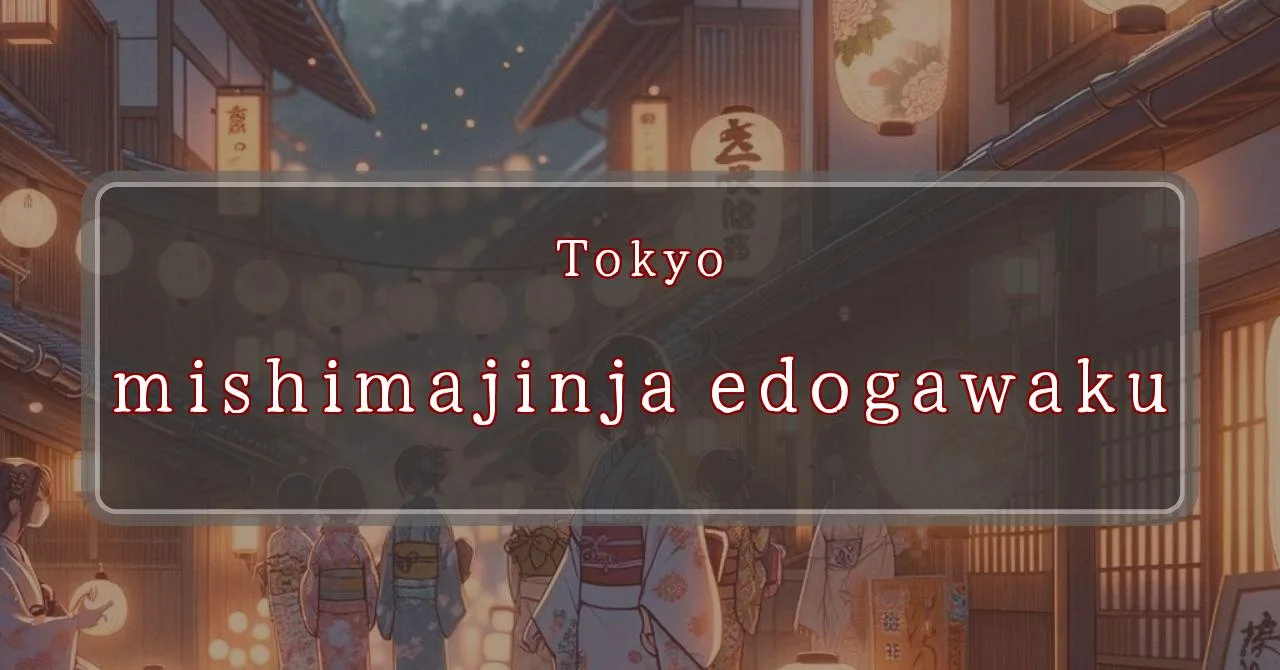Divine melodies echo through the streets of Edogawa
Basic Information
Discover the enchantment of Mishima Shrine, a sacred haven nestled in the heart of Edogawa, Tokyo.
- Address: 6-10-3 Matsue, Edogawa-ku, Tokyo
- Phone Number: Unavailable
- Access: Embark on a leisurely 11-minute stroll from the south exit of Shinjuku Line’s Funabori Station or a 17-minute walk from the Kanana exit of Shinjuku Line’s Ichinoe Station.
- Festival Days: Immerse yourself in the festivities on June 15th (Sat) and 16th (Sun), 2024 (Reiwa 6).
Main Events and Attractions of the Festival
Immerse yourself in the vibrant festivities of the Mishima Shrine Festival, a spectacle of music, dance, and cultural heritage.
Kagura Performance
Witness the ethereal beauty of Kagura, a sacred dance performed by shrine maidens. Their graceful movements and enchanting melodies create an atmosphere of reverence and awe.
- Overview: A sacred dance performed by shrine maidens
- Features: Graceful movements and enchanting melodies
Mikoshi Procession
Feel the pulse of the festival as the Mikoshi, a portable shrine, is carried through the streets in a grand procession. Accompanied by lively music and enthusiastic participants, this spectacle is a testament to the community’s unity and devotion.
- Overview: A grand procession carrying a portable shrine
- Features: Lively music, enthusiastic participants, and a display of community spirit
Renketsu Mikoshi
Marvel at the Renketsu Mikoshi, a breathtaking display of unity as multiple Mikoshi from neighboring shrines converge in a synchronized procession. This symbolic act represents the harmonious bonds between communities and the shared spirit of celebration.
- Overview: A synchronized procession of multiple Mikoshi
- Features: A symbol of unity and harmonious bonds between communities
Blessings and Deities
Discover the divine blessings and deities enshrined at Mishima Shrine, revered for their benevolence and miraculous powers.
- Overview: A sacred haven dedicated to deities bestowing blessings and protection
- Deities:
- Ooyama-tsumi-no-Kami: Deity of mountains, revered for protection and stability
- Iwato-tsutsu-no-o-Kami: Deity of rocks and caves, associated with strength and resilience
- Konohana-sakuya-hime-no-Kami: Deity of cherry blossoms and fertility, celebrated for beauty and grace
Origin and History
Unravel the captivating history of Mishima Shrine, a tale of devotion, resilience, and enduring traditions.
- Overview: A legacy spanning centuries, steeped in cultural significance
- Establishment: Enshrined during the Kansei era (1789-1801), rooted in the community’s desire for divine protection
- Historical Events:
- Designated as a branch shrine of Funabori Hie Shrine in the Meiji era (1868-1912)
- Gained independence as a religious法人 in the Showa era (1926-1989)
Tips and Notes for Visitors
Ensure a fulfilling and respectful visit to Mishima Shrine with these essential tips and notes.
- Overview: Guidelines for a meaningful and respectful pilgrimage
- Etiquette:
- Approach the shrine with a pure heart and sincere intentions
- Observe proper attire, avoiding overly casual or revealing clothing
- Maintain silence and refrain from loud conversations within the shrine grounds
- Photography:
- Photography is generally permitted within the shrine grounds, but avoid using flash or disturbing other visitors
- Respect the sacred nature of the shrine and refrain from touching or leaning against the shrine buildings
Parking Information
Plan your visit to Mishima Shrine with ease, utilizing the available parking options.
- Overview: Convenient parking facilities to accommodate visitors
- Parking Lots:
- Limited parking spaces are available near the shrine
- Additional parking options can be found in the surrounding area
- Fees:
- Parking fees may apply, varying depending on the location and duration of parking
Popular Stalls and Food Carts in Recent Years
| Type of Stall | Description |
|---|---|
| Takoyaki | A staple at Japanese festivals. Characterized by a crispy outside and a creamy inside. |
| Jaga Butter | A simple yet popular snack of hot potatoes lavishly topped with melted butter. |
| Baby Castella | Small castella cakes, sweet and fluffy treats enjoyed by children and adults alike. |
| Grilled Ayu with Salt | Fresh ayu fish grilled whole with salt, a savory taste of Japanese summer. |
| Shaapin | A unique gourmet item influenced by foreign cuisine, with a chewy skin wrapping the filling. |
| Okonomiyaki | A Japanese grilled dish where you often choose your own ingredients for a personalized flavor. |
| Cotton Candy | A fluffy, sweet snack that’s extremely popular with children. |
| Chocolate Banana | A banana coated in chocolate, a fun and visually appealing dessert. |
| Kushiyaki | Various types of ingredients skewered and grilled, an easy-to-enjoy snack. |
| Yakisoba | Fried noodles mixed with a special sauce, a fast food favorite in Japan. |



